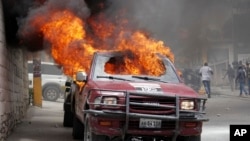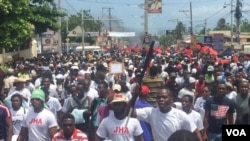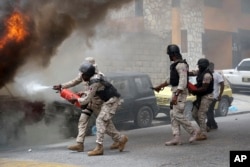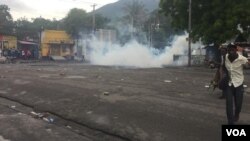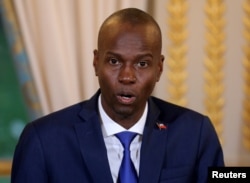Anti-graft protesters in Haiti's capital, Port-au-Prince, targeted journalists Monday as they continued marching around town to demand the president's resignation. It remains unclear why the journalists were attacked.
Monday's rampage followed massive nationwide protests Sunday that resulted in two deaths and substantial property damage in some neighborhoods.
The protesters were demanding President Jovenel Moise’s resignation over allegations of fraud and mismanagement of government funds. They vow to remain in the streets until their demands are met.
Media targeted
Former VOA Creole affiliate Radio-Tele Guinen's vans parked in front of the station and loaded with equipment were burned and looted. Reporter Matiado Vilme saw an overturned vehicle in the middle of the road where others' windows were broken. Employees of the station, which is seen and heard nationwide, scrambled to put out fires before firemen arrived on the scene.
"We extinguished the fire ourselves," a visibly shaken employee told VOA Creole, "because the firefighters arrived late. The anti-riot police came to help us, too, but it was too late. A lot of our vehicles were already burned."
Late Monday night, journalist Rospide Petion, who works for RSF (Reporters Without Borders), was shot and killed on his way home. He had spent the day reporting on the second day of protests. The news stunned the community of local journalists, some of whom said they had spent part of the day gathering photos and video, and doing interviews alongside him. It was a sobering reminder of the daily dangers they face on the job.
Fire engulfs gas station
Earlier, in the Delmas neighborhood, protesters set fire to a gas station, causing anxiety among residents and law enforcement officials about the potential danger and catastrophic damage an explosion would cause.
"I'm a professional, but today instead of working I'm out in the streets because my children can't go to school," a man who said he works construction, does carpentry and steel work told VOA Creole. " Nothing is functioning. I wouldn't even mind if foreigners were to step in [to run the country] but [President Moise] is incapable of governing. Give the people a chance."
"I like what's happening out here," another protester said. "Jovenel [the president] is too cruel. He can't do anything for the people at this point."
What sparked protests?
President Moise is accused of fraudulently benefiting from funds generated by the PetroCaribe oil alliance with Venezuela.
The allegations were made in an official report handed to Haiti’s Senate on May 31. Haiti's Superior Court of Accounts and Administrative Litigation [Cour Supérieure de Comptes et du Contentieux Administratif] — a nonpartisan institution tasked with overseeing the government's budget, spending and allocation of funds — prepared the report detailing irregularities and alleged abuse of funds generated under the PetroCaribe agreement.
Moise has denied the allegations, calling them political, and his representatives have cast doubts on the methodology used to generate the report.
President Jovenel Moise has not yet commented on the mass protests.
Protest organizers have called for a nationwide strike on Tuesday.




